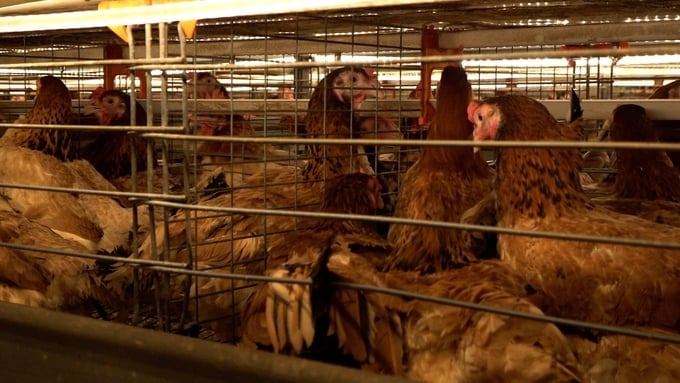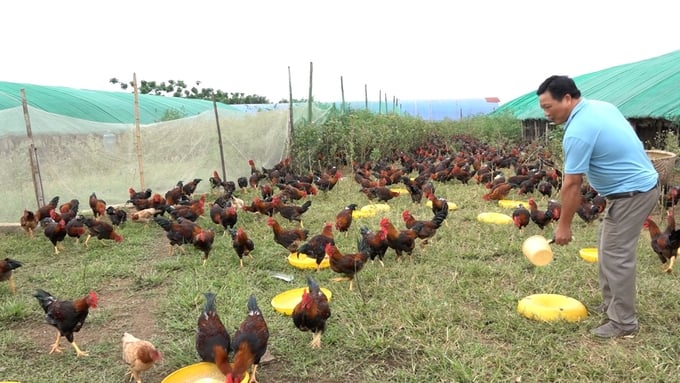June 19, 2025 | 10:01 GMT +7
June 19, 2025 | 10:01 GMT +7
Hotline: 0913.378.918
June 19, 2025 | 10:01 GMT +7
Hotline: 0913.378.918

Poultry flu causes huge economic losses to the poultry industry, can be contagious and cause death. Photo: Hong Tham.
Avian influenza is a very dangerous infectious disease in domestic and wild poultry, caused by a virus, and can cause poultry mortality at a rate of up to 100%.
Avian influenza causes huge economic losses to the poultry industry. It can be contagious and cause death.
Avian flu was first detected in Vietnam at the end of 2005. To date, three strains of highly pathogenic avian influenza virus A/H5N1, A/H5N6 and A/H5N8 have been discovered that cause disease in poultry.
Avian influenza viruses can live for a long time in the air at low humidity and in faeces at low temperatures and high humidity conditions. The virus can live up to 35 days in low-temperature barns, and up to several months in infected poultry feces, dead poultry carcasses, or in frozen poultry products.
Viruses are easily destroyed at a temperature of 70 degrees Celsius in 5 minutes.
Some types of disinfectants licensed for use in veterinary medicine, lime powder, and 10% lime water can kill avian influenza viruses.
Poultry species such as chickens, turkeys, ducks, geese, quails, pigeons, ostriches, wild birds and mammals of all ages can get avian influenza. In particular, viruses can infect and cause disease in humans.
Poultry is spread in 2 ways:
Direct transmission through contact: Keeping healthy poultry together with sick poultry or raising them together. Infection from wild birds carrying disease.
Indirect transmission through: feces, blood, excretions of poultry and wild birds carrying the disease. Transportation, livestock tools, cages, bedding, and bran packaging... carry pathogens. Water and food sources carry pathogens. The shoes and clothes of breeders carry pathogens.

In the first 3 months of 2024, the country had 6 outbreaks of avian influenza A/H5N1 occurring in 6 provinces and cities across the country. Photo: Hong Tham.
Poultry shakes their heads, tremble, feel tired, lie in groups, have tears, drool, cough, wheeze, sinusitis, eyelid swelling, and joint swelling.
Swelling of the head and face, swelling of the eyelids, cyanosis, bleeding under the skin, diarrhoea, thin white or greenish-white stools. Laying birds have reduced productivity or lay eggs without shells.
Lesions at autopsy: Hemorrhage in the trachea, lungs, liver, spleen, kidneys, glandular glands, cecum, small intestine, anus, ovaries, testicles, dense air sacs, casein foci, pericardium, hemorrhagic myocardium, flabby heart, hemorrhagic myocardium, containing a lot of yellow fluid and the meninges are congested.
Do not hide the flu. Immediately notify local authorities, veterinary staff or veterinary authorities. Do not buy, sell or transport sick or dead poultry.
Do not throw dead poultry carcasses into the environment or rivers, streams, ponds, lakes... Do not slaughter or consume sick or dead poultry meat.
Do not let anyone near the poultry, especially children. Destroy all poultry flocks according to the instructions of the veterinary agency. Conduct general cleaning and disinfection of livestock areas with chemicals and lime powder.
Strictly apply biosafety farming measures, and regularly clean and disinfect areas where chemical panels and lime powder are kept. Vaccinate poultry to prevent avian influenza and other infectious diseases.
Poultry breeds must have a clear and reliable origin; Newly purchased poultry are kept separately for 1-2 weeks before being introduced into the herd.
Poultry that has been brought to the market to sell but not sold, when brought back, needs to be kept separately for 1 - 2 weeks.
Keeping poultry in barns or fenced areas; Minimize raising poultry with other animals at the same farming location.
Poultry caretakers must use boots, shoes, and personal protection when entering the livestock area. Restrict visitors from entering and leaving the livestock area. If you have to go out or go in the area, you need to change to new boots or shoes or wash the soles of boots and shoes with soapy water or disinfectant solution.
Do not leave vehicles or transportation tools in the livestock area. In case of necessity, spray disinfectant or wash the vehicle with soap.
Supplementing nutrients and minerals to improve poultry resistance. When there is information about an avian flu epidemic occurring in the same commune or surrounding area, it is necessary to strengthen disease prevention measures.
In the first 3 months of 2024, the country had 6 outbreaks of avian influenza A/H5N1 occurring in 6 provinces, including: Bac Ninh, Ninh Binh, Khanh Hoa, Ba Ria-Vung Tau, Long An and Tien Giang, forced to destroy 8,924 poultry, an increase of 25% over the same period in 2023.
The Department of Animal Health believes that in the coming time, the risk of avian influenza spreading and occurring on a large scale is very high due to: the total number of poultry flocks being large, small-scale farming still accounts for the majority, not meeting veterinary hygiene requirements, many poultry flocks have not been vaccinated.
Avian influenza virus (A/H5 virus strains including: H5N1, H5N6, H5N8...) circulates in many localities at a fairly high rate (about 5%).
Trade, transportation, and consumption of poultry and poultry products in the country have increased, and small-scale slaughter is still very common. The country still has over 22,000 small slaughterhouses.
Smuggling of poultry and poultry products also occurs in border provinces. Extreme weather conditions reduce the resistance of livestock, creating conditions for pathogens to grow and cause disease.
Translated by Hoang Duy

(VAN) After 5 years of implementation, the CAI initiative has helped coffee growers change their farming practices, moving toward responsible agriculture that meets global export standards.

(VAN) The primary prerequisite for the comprehensive and robust integration of Vietnam's livestock sector into the global value chain is the establishment of a disease control system.

(VAN) The results of national programs are essential for establishing a contemporary livestock sector that is well-equipped to meet the demands of both domestic and international markets, with robust biosafety standards.

(VAN) The UNESCO Global Geopark revalidation of Non nuoc Cao Bang and the transition to a two-tier administrative model are presently undergoing a pivotal moment in Cao Bang, the northernmost province of Vietnam.
/2025/06/13/5330-2-004539_953.jpg)
(VAN) Changing policy mindset and removing investment barriers are urgent requirements to open up new development space for enterprises in the agricultural sector.

(VAN) The areas include the restoration of five million hectares of marine ecosystems.

(VAN) Dr. Le Van Nguyen, Director of the Institute of E-Commerce Management (ECM), emphasizes the potential for green development through the cultivation of fruit trees, particularly in provinces such as Son La.